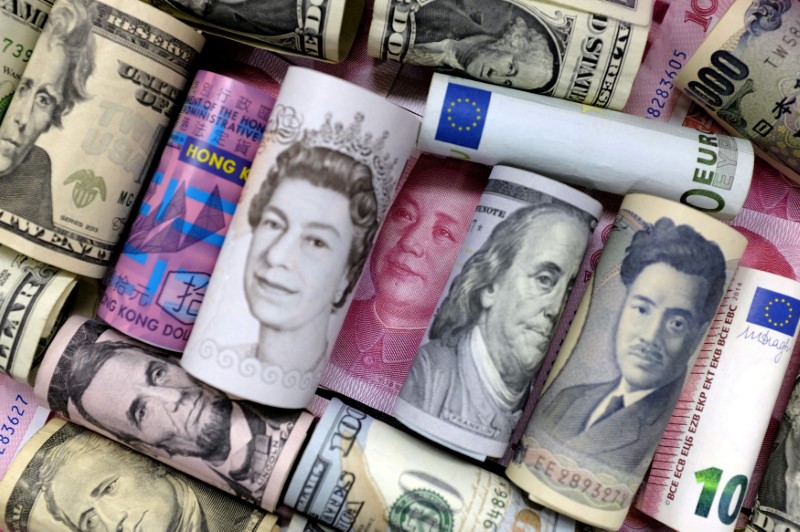 © Reuters. FILE PHOTO: Euro, Hong Kong dollar, U.S. dollar, Japanese yen, pound and Chinese 100 yuan banknotes are seen in this picture illustration
© Reuters. FILE PHOTO: Euro, Hong Kong dollar, U.S. dollar, Japanese yen, pound and Chinese 100 yuan banknotes are seen in this picture illustrationBy Hideyuki Sano
TOKYO (Reuters) – The dollar started the week little changed on Monday as traders set sights on new Federal Reserve Chair Jerome Powell’s first monetary policy meeting later in the week and as the increased threat of trade protectionism kept markets on edge.
The Japanese yen has also moved little so far though traders were nervous after weekend polls suggested a massive drop in public support for Prime Minister Shinzo Abe over his handling of a festering cronyism scandal.
The stood flat at 90.274 () (), having gained on Friday following strong U.S. economic data, marking the index’s third straight week of gains.
U.S. industrial production surged in February, boosted by strong increases in output at factories and mines. The University of Michigan Consumer Sentiment Index also rose in March to the highest level since 2004.
The figures reinforced views that the global economy is enjoying strong growth and that the Federal Reserve will raise interest rates at the end of its policy meeting on Wednesday.
With a 25 basis point rate hike seen as a done deal, one key focus is on whether Fed policy makers forecast four rate hikes this year instead of three they had projected at December meeting.
The prospects of more rate hikes typically support a currency because higher interest rates tend to attract funds. However, recent political headlines have drawn more attention as investors fret that U.S. President Donald Trump’s tariff and other protectionist policies could disrupt the U.S. and global economy.
The Canadian dollar has taken the brunt of worries about U.S. protectionism, falling to lowest levels since late June last week as investors discount the risk Trump may walk out of the North American Free Trade Agreement.
The Canadian currency slipped to C$1.3103 per U.S. dollar
In Japan, the yen has been hit by uncertainties on domestic politics as Prime Minister Shinzo Abe came under more pressure due to suspicions of a cover-up linked to his cronyism scandal.
A Nippon TV poll found Abe’s support crumbling some 14 percentage points from last month to 30 percent, the lowest for that poll in Abe’s more than five years in office.
The dollar changed hands at 105.96 yen
While political instability does not make Japanese assets attractive, most traders think the yen will rise if Abe bas to resign given that his aggressive monetary stimulus has been helping to push the yen lower.
“Japanese political risk will be a market focus for now. There is the risk that ‘Abenomics’ will be rolled back,” said Shinichiro Kadota, strategist at Barclays (LON:).
The euro () stood at $1.2285, where it has support around its 55-day moving average.
The common currency has been in a holding pattern since it hit a three-year high of $1.2556 on Feb. 16, with its March 1 low of $1.21545 seen as another support level.
Fusion Media or anyone involved with Fusion Media will not accept any liability for loss or damage as a result of reliance on the information including data, quotes, charts and buy/sell signals contained within this website. Please be fully informed regarding the risks and costs associated with trading the financial markets, it is one of the riskiest investment forms possible.
Source: Investing.com




























